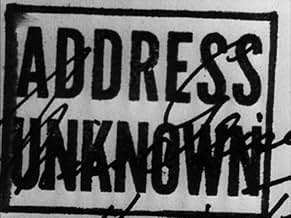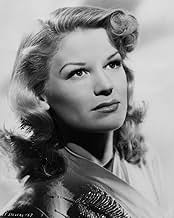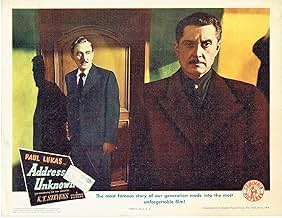US art dealer returns to his native Germany for a visit and is attracted by Nazi propaganda.US art dealer returns to his native Germany for a visit and is attracted by Nazi propaganda.US art dealer returns to his native Germany for a visit and is attracted by Nazi propaganda.
- Nominated for 2 Oscars
- 2 nominations total
- Youngest Schulz Boy
- (as Larry Joe Olsen)
- Rock-Tossing Rioter
- (uncredited)
- Nazi Party Member
- (uncredited)
- Director
- Writers
- All cast & crew
- Production, box office & more at IMDbPro
Storyline
Did you know
- TriviaK.T. Stevens (real name: Gloria Wood) is the daughter of the film's producer, Sam Wood.
- GoofsWhen Griselle first puts her bloody hand on the frame of Schulz's entrance door after he opens up, the right hand is placed at a certain height and angle while the fingers are spread in a certain shape. But in the following cuts, the hand and fingers have constantly changed angles and positions. In addition, the shape of the bloody hand-print left on the door frame after Schulz closes the door does not match the shape and location Griselle originally placed her hand.
- Quotes
Baron von Friesche: Does he know the conditions he doesn't like? I find that hard to understand. I myself would hesitate to form conclusions without firsthand evidence. You must set him right. I suppose it isn't easy for a foreigner to understand the agonies our people have suffered since the Treaty of Versailles. What years of less and less bread, of leaner bodies, of the end of hope...
[pauses to offer Herr Schulz a cigarette]
Martin Schulz: [accepting a cigarette] Oh, thank you.
Baron von Friesche: The quicksand of despair held us. Then just before we died, a man came and pulled us out.
Baron von Friesche: [turning to Herr Professor] You are a native of Munich, Herr Professor?
Professor Schmidt: Well, uh...
Baron von Friesche: You have *witnessed* this deliverance.
Professor Schmidt: If it *is* a deliverance...
Baron von Friesche: [turning to Herr Schulz] You know, there's a surge, my friend. A surge. Our whole despair has been thrown aside like a forgotten coat. No longer do we wrap ourselves in shame.
Baron von Friesche: [turning to Herr Professor] What can be wrong about a man who affects people so?
Professor Schmidt: When people are hungry, they don't care *what* kind of a man it is who gives them bread.
- Crazy creditsThe final fade-out is a closeup of the returned letter, specifically the "Address Unknown" stamped in English. It forms an end title card, which was itself unusual for its time.
The film begins in the 1930s. Paul Lukas and his wife and kids (minus the oldest one) are leaving the US and moving back to Germany. They also decide to take their god-daughter (who is Jewish). Once there, Lukas slowly turns from a nice family man to a Nazi-lover. In the process, all sense of right and wrong seems to disappear from him. And, when his beloved god-daughter is in trouble, he refuses to help. At this point, there is a neat twist in the film involving coded messages and revenge. I won't say more, as it would spoil the film. Suffice to say that this twist gives the film a nice and fitting ending.
The acting, mood and story are all quite good and the film worth seeing. While not a great film it is clever and well-written--and a very good propaganda film to galvanize the folks at home in the war effort.
- planktonrules
- Jun 11, 2010
- Permalink
Details
- Release date
- Country of origin
- Languages
- Also known as
- Адрес неизвестен
- Production company
- See more company credits at IMDbPro
- Runtime1 hour 15 minutes
- Color
- Aspect ratio
- 1.37 : 1
Contribute to this page





































